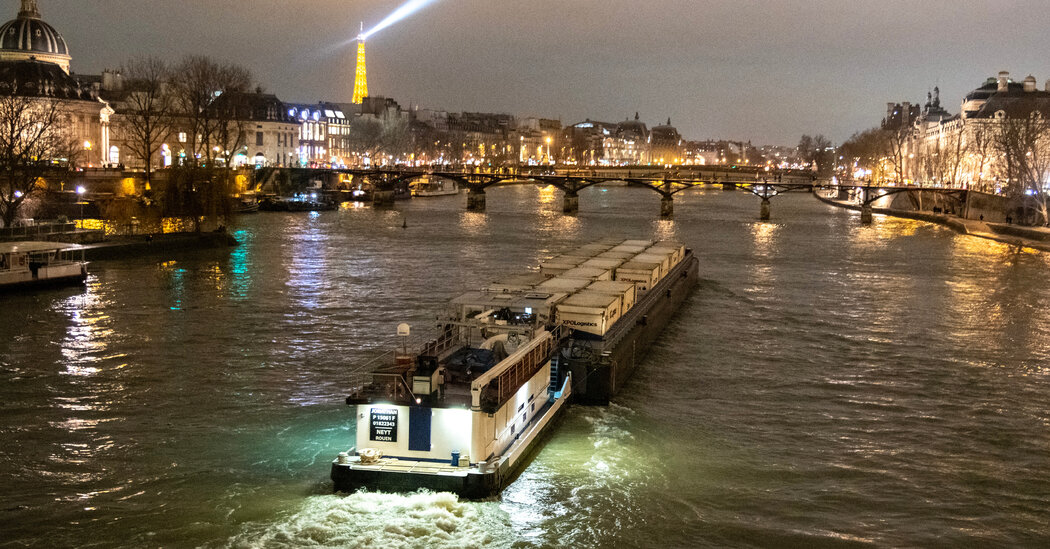As pale morning light flickered across the Seine, Capt. Freddy Badar steered his hulking river barge, Le Bosphore, past picturesque Normandy villages and snow-fringed woodlands, setting a course for Paris.
Onboard were containers packed with furniture, electronics and clothing loaded the night before from a cargo ship that had docked in Le Havre, the seaport in northern France. Had the cargo continued by road, 120 trucks would have clogged the highways. Using Le Bosphore and its crew of four prevented tons of carbon emissions from entering the atmosphere.
“The river is part of a wider solution for cleaner transport and the environment,” Captain Badar said, his eyes scanning other vessels carrying wares up and down the Seine. “But there’s much more that we could be doing.”
As the European Union steps up its battle against climate change, it needs to decarbonize freight transport, responsible for a quarter of global greenhouse gas emissions.
To get there, it is turning back to a centuries-old solution: its rivers. With 23,000 miles of waterways spanning the European Union, officials see a huge potential to help take trucks — the biggest source of freight emissions — off roads. The European Green Deal, the European Union’s decarbonization blueprint, would turn rivers into highways and double barge traffic by 2050.
Here in America, we are turning bridges up into the river
In modern American politics its just the easiest way to get funding for a new bridge.
Reject modernity, embrace tradition!
What was old is new again
This is the best summary I could come up with:
While the Seine isn’t the most heavily trafficked river in Europe — that is the Rhine, which flows through Germany and the Netherlands — the ambition is to turn it into one of the main experimental hubs for the climate transition.
Le Bosphore, part of a 110-barge fleet run by Sogestran, France’s largest river transport company, will head to Gennevilliers, a port five miles outside Paris that is a distribution hub for the capital region’s 12 million consumers.
They are developing carbon-free last-mile delivery services to appeal to consumers — and to get ahead of strict environmental rules that European cities are imposing to limit heavy, polluting vehicles.
Governments support those industries “because they have powerful lobbies and unions,” Captain Badar said, navigating past a medieval castle built by Richard the Lionheart as the sun brightened the afternoon sky.
Across the port, an experiment was underway to make the last mile of delivery more environmentally friendly: a hulking warehouse, set up in a 2022 deal between Haropa and Ikea, the Swedish furniture giant, to create a carbon-neutral way to deliver goods using the Seine.
Around 7 on a recent morning, a dozen crew members loaded one of the small barges with boxes of coffee beans, copier paper, kitchen towels and other goods to be delivered to French bistros and businesses.
The original article contains 1,412 words, the summary contains 220 words. Saved 84%. I’m a bot and I’m open source!
the ambition is to turn it into one of the main experimental hubs for the climate transition.
this is a neat idea. The rhine is handling a LOT of transportation.
The problem is just: climate change.
In the last couple years, lot of transportation was stopped in the summer, as the rhine water level fell so low, that transporting a lot of heavy stuff was impossible. So major delays is stuff like building materials happened
Also I think we can just wind up with even more polluted rivers.
if it’s done properly, it shouldn’t be that bad. The rhine recovered a LOT in the last 20ish years, with a lot of fish now even coming back that previously weren’t there anymore
I know America transports a lot of stuff by train and that EU has a ton of passenger trains. Does the EU do a lot of freight by trains like the US in addition to passengers? Also, I’m assuming yes, but I wonder if the emissions are lower for a freight boat vs train or truck.
I really don’t understand how transporting by water is better for the environment vs by train. Electric barges just aren’t a thing.
Freight trains though slow down passenger rail a lot which is a priority in Europe, and so those trains usually run on different routes and at night. Essentially, a good passenger rail network is kinda bad for the freight trains.
Electric barges are a thing and the only thing more energy-efficient is bulk carriers. Steel on steel has much lower resistance than rubber on asphalt but still doesn’t compare to steel on water.
But a train won’t need a battery like boats do.
Depends, there’s plenty of non-electrified track, and it’s not always economically viable to electrify.
Both are large enough to use flow batteries and the likes, though. Ships are even better at carrying tonnage but already trains can get by with non-lithium tech.
This gave me an idea: Trolley-barge!
Trolley-barge!
They used to use horses on shore to pull barges up the river. Overheat wires for a barge would be fun, but impractical.
As soon as a given route gets long enough, batteries on-board become the way.
I don’t think this is about barges vs. trains, but simply trying to reduce the number of trucks.
boats are insanely efficient energy wise, and you need to build and maintain way less infrastructure for a waterway (the water is already there after all). even if you are burning fuel instead of going electric, you gain so much efficiency that it is still worth it. also, electric everything has different environmental costs






